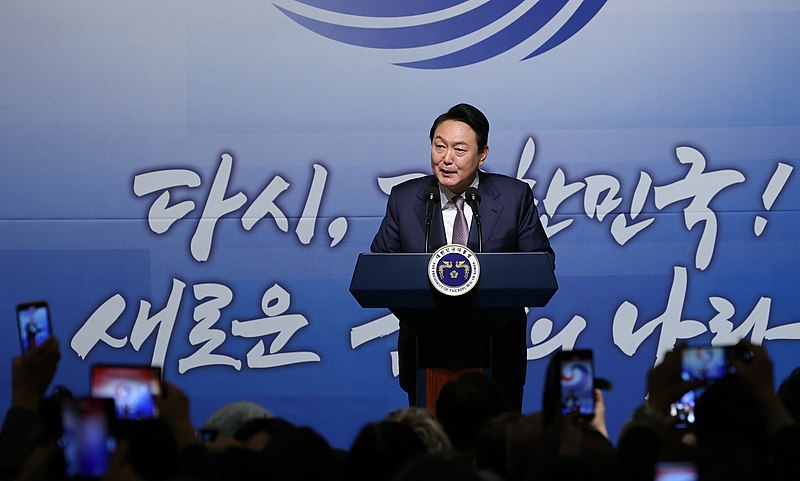South Korea was recently confirmed to be taking part in the upcoming summit of the NATO alliance in Madrid this month. The country’s national security adviser said Seoul intends to establish a diplomatic mission to the alliance at the conference.
Reuters reports South Korea’s national security adviser Kim Sung-han told reporters regarding President Yoon Suk-yeol’s attendance at the summit in Spain that Seoul is looking to bolster relations with NATO countries amidst an “unpredictable” international situation.
South Korea is already in discussions with NATO on information sharing, combined exercises, and coordinated research to counter potential threats.
Yoon, who was inaugurated as South Korea’s new president in May, has aimed to make the country a “global pivotal state” with a focus on promoting freedom, peace, and prosperity based on the country’s liberal democratic values.
Kim also said that while the upcoming conference in Madrid will largely focus on the ongoing war in Ukraine, Yoon intends to rally global cooperation against North Korea’s nuclear program.
NATO chief Jens Stoltenberg said the upcoming summit is expected to sign off on an assistance package for Ukraine that will help the country transition to using NATO-standard military equipment instead of Soviet-era weapons.
South Korea’s Yonhap news outlet said Seoul is also planning to announce additional humanitarian aid for Ukraine at the meeting but not lethal aid.
The outlet added that Yoon may look to hold a trilateral meeting with US President Joe Biden and Japanese Prime Minister Fumio Kishida on the sidelines of the summit.
Last week, Yoon called for a coordinated response from the UN Security Council against Pyongyang’s increasing missile provocations, according to local news outlet Newsis.
Yoon made the remarks during his phone conversation with UN Secretary-General Antonio Guterres, in which he also called for close communication to assist North Korea in curbing the COVID-19 pandemic that the isolated nation is currently facing.
Yoon’s call for a coordinated response follows the vetoing of China and Russia of a US-led effort to impose new UN sanctions on North Korea over its repeated missile tests.
The double veto has led to a division in the 15-member council for the first time since it started to punish North Korea for its weapons tests back in 2006.



 Israel Declares State of Emergency as Iran Launches Missile Attacks
Israel Declares State of Emergency as Iran Launches Missile Attacks  Trump Launches Operation Epic Fury: U.S. Strikes on Iran Mark High-Risk Shift in Middle East
Trump Launches Operation Epic Fury: U.S. Strikes on Iran Mark High-Risk Shift in Middle East  Trump Warns Iran as Gulf Conflict Disrupts Oil Markets and Global Trade
Trump Warns Iran as Gulf Conflict Disrupts Oil Markets and Global Trade  Trump Says U.S. Combat Operations in Iran Will Continue Until Objectives Are Met
Trump Says U.S. Combat Operations in Iran Will Continue Until Objectives Are Met  Israel Strikes Hezbollah Targets in Lebanon After Missile and Drone Attacks
Israel Strikes Hezbollah Targets in Lebanon After Missile and Drone Attacks  Australia Rules Out Military Involvement in Iran Conflict as Middle East Tensions Escalate
Australia Rules Out Military Involvement in Iran Conflict as Middle East Tensions Escalate  UK Accepts U.S. Request to Use British Bases for Defensive Strikes on Iranian Missiles
UK Accepts U.S. Request to Use British Bases for Defensive Strikes on Iranian Missiles  Does international law still matter? The strike on the girls’ school in Iran shows why we need it
Does international law still matter? The strike on the girls’ school in Iran shows why we need it  Iran Supreme Leader Ayatollah Ali Khamenei Killed in Israeli, U.S. Strikes: Reuters
Iran Supreme Leader Ayatollah Ali Khamenei Killed in Israeli, U.S. Strikes: Reuters  Russia Signals Openness to U.S. Security Guarantees for Ukraine at Geneva Peace Talks
Russia Signals Openness to U.S. Security Guarantees for Ukraine at Geneva Peace Talks  EU Urges Maximum Restraint in Iran Conflict Amid Fears of Regional Escalation and Oil Supply Disruption
EU Urges Maximum Restraint in Iran Conflict Amid Fears of Regional Escalation and Oil Supply Disruption  Trump Announces U.S. Strikes on Iran Navy as Conflict Escalates
Trump Announces U.S. Strikes on Iran Navy as Conflict Escalates  Suspected Drone Strike Hits RAF Akrotiri Base in Cyprus, Causing Limited Damage
Suspected Drone Strike Hits RAF Akrotiri Base in Cyprus, Causing Limited Damage  U.S. Lawmakers Question Trump’s Iran Strategy After Joint U.S.-Israeli Strikes
U.S. Lawmakers Question Trump’s Iran Strategy After Joint U.S.-Israeli Strikes  Zelenskiy Urges Change in Iran After U.S. and Israeli Strikes, Cites Drone Support for Russia
Zelenskiy Urges Change in Iran After U.S. and Israeli Strikes, Cites Drone Support for Russia  Middle East Conflict Escalates After Khamenei’s Death as U.S., Israel and Iran Exchange Strikes
Middle East Conflict Escalates After Khamenei’s Death as U.S., Israel and Iran Exchange Strikes  Israel Launches Fresh Strikes on Iran After Death of Supreme Leader Ayatollah Khamenei
Israel Launches Fresh Strikes on Iran After Death of Supreme Leader Ayatollah Khamenei 































